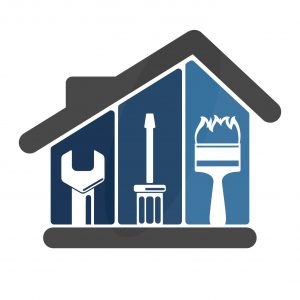
Did you know that a one-eighth inch crack in a pipe spews out 250 gallons of water per day?
How about half of smoke alarms not working during a fire were because of disconnected or old batteries?
The truth is, house-maintenance upkeep is important. We can do our part to prevent disasters from occurring. Or having an emergency plan when one does occur.
To do this, you need to know these 12 house-maintenance mistakes.
In this article, you’ll learn:
- When to replace fire alarms
- The ins and outs of water damage
- Why power-washing near masonry is a bad idea
- Plus a surprising consequence to putting tape on walls
That, and more!
Read on to find out…
1. Water in the pipes during winter
Anything that involves water during cold temperatures has the potential to freeze.
Pipes are no exception.
Leaving water in the pipes during frosty temperatures may cause the pipes to rupture. You’ll not only have the cost of repairing the pipe but the cost of the water damage.
Remember how a one-eighth inch crack gushes out 250 gallons of water?
Well, imagine the damage a huge pipe crack (or cracks!) can cause.
To prevent this…
Turn on a couple heaters near the pipes. Also, turn on your kitchen faucet to a warm drip. That way, when you do need water, there won’t be a drastic change from cold to hot.
2. House-maintenance fixes? It can wait…
Doing house-maintenance fixes can be tedious when you’ve already spent several hours at work.
Often times, this results in procrastination.
While you may be having a fun time at Disneyland or going to that delicious restaurant, it’s not going to be fun when there’s water damage. Or there’s a crack in your foundation.
In most cases, procrastination causes you to spend more in the long run than fixing the house-maintenance hassles in the first place.
To prevent this…
Commit to fixing one house-maintenance appliance per week. That way, you can still have your fun. And know that your pipes aren’t going to burst. Or your toilet isn’t leaking.
3. Not sealing cracks in windows and doors
No matter how sealed your windows and doors are, with time there’s going to be a crack here and there.
Failing to caulk these cracks will make your house colder.
To prevent this…
Stay on top of this household-maintenance task by sealing doors and windows with caulking or another weatherstripping material.
Doing this ensures there won’t be a chill in your house (fewer colds?).
This should also lower your energy bill. Since you won’t be using your heater more because of the better heat retention.
4. Power-washing near masonry
Power-washing is a great tool to get rid of mold, grime, and dust from surfaces.
However, doing it too close to the masonry will cause mineral deposits to come out. This causes white streaks on the bricks, which will be hard (if not impossible) to get off.
To prevent this…
Make sure you power-wash away from masonry. To get rid of mold and mildew on bricks, use a gallon of warm water mixed with 1 quart of bleach. And scrub with a stiff-bristle brush.
Ensure you rinse off the water-bleach mix afterward.
5. Leaves and debris in gutters
Gutters with dirt, grime, and leaves is a water damage (and mold) disaster waiting to happen.
How so?
If the gutters aren’t regularly cleaned, water from a rainy day will sit there. If you don’t know, mold thrives in moisture (hence water). Stagnant water and organic materials is a mold paradise.
Not only this but if your gutters are extremely clogged, the water can go over them. This would put your landscaping and foundation at risk for water damage.
And, if you happen to live in a cold climate, the water can freeze. Which will make it hard to scrape out the gutters.
To prevent this…
Simple. Clean out your gutters at least twice per year, mainly in the fall and spring.
6. Not power-washing windows and siding
Using a bucket of water and soap to wash your windows and siding will take all day.
This encourages procrastination. Which, as we mentioned earlier, leads to not doing house maintenance fixes, causing disasters.
To prevent this…
While we mentioned power-washing near masonry isn’t recommended, power-washing still should be done on the windows and (non-masonry) siding. Why?
Because it’s a lot faster and more efficient than using a sponge, bucket of water, and soap.
Even if you use a garden hose (which sprays 50 pounds per square inch), a power washer uses 1,500 to 4,000 psi. That’s 30 to 80 times the amount of pressure compared to your typical garden hose.
7. Not fixing leaks right away
Not fixing this house-maintenance task the moment it starts risks water damage and mold.
To prevent this…
Fix them! Not sure if you have a leak? Try these house-maintenance tricks.
Put a couple drops of food coloring in the toilet tank. If in less than 15 minutes you see the color from the food coloring in the bowl, you have a toilet leak.
Also, turn on the bathroom faucet. Keep that faucet on while you turn on the kitchen faucet.
If the stream of one of the faucets is less, that means there’s a pressure problem. This could be due to a potential leak.
In addition to this, read and record your water meter. Then turn off your water supply, not using water for 2 hours.
Read your meter again. If there’s a change, you know you have a leak.
8. Not periodically checking smoke detectors
Not doing this will increase the risk of accidents and injury should a fire occur.
Sadly, 3 out of 5 deaths due to a fire occurred in places with no smoke alarm.
To prevent this…
Replace smoke detectors every 5-10 years. Note that there should be a smoke detector inside and outside of every bedroom as well as every level.
Also, vacuum and clean the detectors at least once per year. You don’t want debris to affect the sound quality or functionality.
On top of this, test the smoke detectors (and carbon monoxide detectors) multiple times throughout the year. Doing this will ensure the batteries are in place and that there aren’t duds.
This will also show if all the alarms are wired together (one should alert them all). If not, hire a professional to re-wire the alarms, making sure they’re in sync.
With that being said, replace the batteries. As we said earlier, half of the locations that had a fire had fire alarms that had disconnected or faulty batteries.
9. Failing to replace recalled household appliances
Malfunctioning home appliances caused nearly 12,000 fires in Britain over the past 3 years.
According to this BBC article, the most common appliances to catch on fire are washing machines, dryers, and dishwashers.
Some of the reasons why household appliances cause serious damage to homes is because people fail to replace them once there’s been a recall notification.
This could be because not many people know about the recall. Or some forget to check on the government recall website.
To prevent this…
Periodically check with the United States Consumer Product Safety Commission for the latest recalls.
Also, register your appliances with the manufacturer. That way, should that appliance be recalled, manufacturers have a way of letting you know.
After finding out one of your home maintenance appliances have been recalled, don’t use it.
Follow the manufacturer’s instructions. (Normally, you should be able to swap it out for the updated version.)
10. Having tape on the walls
Tape damages your walls. It’s not putting the tape on. So much as ripping it off. When it’s ripped off, the drywall can get damaged.
To prevent this…
Prevent young children from sticking tape on the walls. If you must use tape on your walls, pull it up gently and slowly—pulling at a steep angle.
11. Not checking the fireplace
According to a Washington Times article, 60% of new homes have at least one fireplace.
Fireplaces add warmth to a home. But failing to have a professional check it once a year increases your risk of house fires.
To prevent this…
Hire a professional to inspect your fireplace. The technician will check the exterior, noting any structural damage. He or she will then inspect the interior gas ignition and heat output.
12. No emergency plan
Our bodies have a fight or flight mechanism, which turns on during an emergency. In most cases, this rush of adrenaline will prevent us from making logical thoughts.
Meaning we might miss key steps during an emergency.
To prevent this…
Have an emergency plan for the common mishaps. Teach every person in the house how to use the water shut-off valve. (This valve controls the main water supply to the faucets, toilets, and washing machine.)
This too goes for the gas shut-off valve. (Everyone should also know how to use a meter wrench and its location in the house.)
Also, know where and how to use the electrical fuse box. And understand how to work the electrical box…and when to use it. (Don’t go near it or use electrical appliances if there are puddles of water.)
Find this helpful? Want more house-maintenance information?
Check out our blog!
